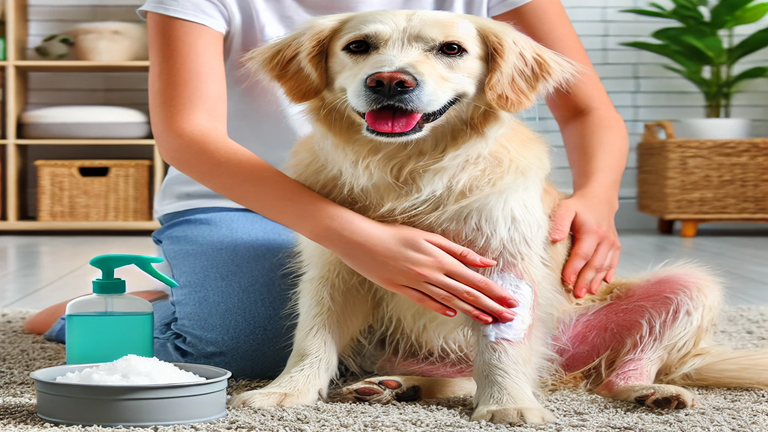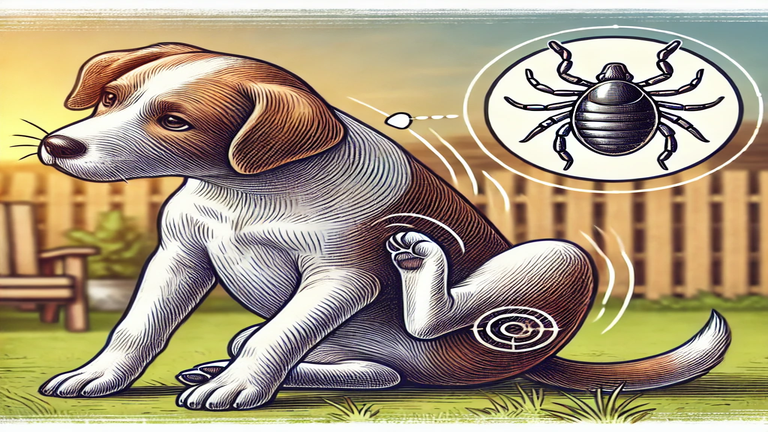Table of Contents

Introduction: Why Is Your Dog Scratching and Biting?
If your dog is scratching and biting, I get it this can be confusing, frustrating, and even a slight worrying. Is it a slight frustration, or something grave? Dogs can’t tell us anything’s wrong, so we’re left playing investigator to figure out what’s producing their distress. But don’t worry you’re not alone, and there are clear ways to help your furry friend.
Scratching is frequently linked to skin irritations, allergies, or pesky parasites, but when you add gurgling sounds from their stomach into the blend, it might point to intestinal issues or a more complex original problem. The good news? Most of these matters can be known and treated, and in many cases, even prevented with a slight extra care and attention.
In this article, we’ll travel all the possible reasons behind this odd combination of symptoms, from tickly skin and digestive worries to unseen triggers like anxiety or allergies. Plus, we’ll rest you with easy-to-follow remedies, preventative tips, and guidance on when it’s time to call the vet. Your pup deserves release and you deserve peace of mind. Let’s dive in!
1. What Reasons Dogs to Scratch and Bite Themselves?
If your dog is scratching and biting, it’s a pure sign that rather is disturbing them. The continuous scratching and biting behavior can choice from slight to strong and force show a change of original causes. One of the most common reasons for dogs scratching and biting is external irritants, such as fleas, ticks, or mites. These tiny pests are often hard to commercial but can cause important worry to your dog, leading to continuous scratching and biting.
But it’s not always about pests. Dogs scratching and biting can also result from medical settings like dislikes, dry skin, or infections. For example, if your dog has a distaste to sure foods or eco-friendly roots, their body force answers with uncomfortable skin, important to scratching and biting. Infections triggered by bacterial or fungal managers can also lead to these signs, leaving your dog in distress.
Behavioral matters can also play a role. If your dog is scratching and biting due to concern, pressure, or even boredom, the problem might become irrational. It’s important to identify the root cause of this behavior to well address it and provide release for your dog.
2. Reasons Why Dogs Compulsively Scratch, Lick, or Chew
Pruritus in Dogs (Itchy Skin)
When your dog is scratching and biting, it could be due to pruritus, a condition that roots irritated skin. Pruritus can be started by distastes, which strength include environmental factors such as pollen or dust lice. If your dog is scratching and biting their paws or coat obsessively, it could be because of an allergic reaction that makes their skin irritated and swollen. Fleas and ticks are also common criminals, causing simple dying that leads to compulsive scratching and biting.
Anxiety and Compulsive Scratching
If your dog is scratching and biting more when you leave the house or during worrying situations like storms, it could be linked to worry. Dogs often scratch and bite compulsively when they feel worried, stressed, or afraid. This behavior can become a handling device to lessen their discomfort. Separation anxiety is mainly common in dogs, causing them to scratch and bite extremely in an effort to calm themselves when you’re not around.
Boredom
Sometimes, the reason yourdog is scratching and biting is simply because they’re tired. Without enough mental or physical motivation, dogs will regularly option to dull behaviors like scratching and biting as a form of entertainment. If your dog isn’t getting enough exercise or attractive toys, this behavior may become more pronounced. If you notice that your dog is scratching and biting due to dullness, try increasing their activity levels with walks, playtime, and improvement activities.
3. My Dog is Continuously Scratching, but They Don’t Have Lice
When your dog is scratching and biting but you’ve ran out lice, its power be time to look for other reasons. Dry skin can be an important issue. If your dog’s skin is dry and crumbly, this can lead to scratching and biting as they try to release the frustration. In colder months, inside heating can also dry out the air, producing your dog to scratch more than usual.
Food allergies can also be at the root of the problem. Dogs scratching and biting can sometimes be a sign that they are allergic to sure parts in their food. Common allergens like chicken, beef, or jots might source frustration to the skin, resulting in scratching and biting behavior.
Another cause to consider is environmental pains, such as dust, growth, or even washing detergents that can start allergic responses. If your dog is scratching and biting after spending time outside or coming in contact with exact products, these could be causal factors.
4. How to Stop Cross Skin from Happening
To help stop your dog from scratching and biting in the future, stoppage is key. Start with a grooming monotonous to keep your dog’s skin and fur clean and well. Even clearing will remove loose fur, dirt, and remains, dipping the chance of irritation that leads to scratching and biting. Make sure to use slight, hypoallergenic shampoos that won’t sliver natural oils from their skin.
A balanced diet rich in omega-3 fatty acids can help maintain healthy skin and lessen dryness, which is often the cause of extreme scratching and biting. Consider adding fish oil additions to your dog’s diet to support their skin health.
Keeping a clean environment is also energetic. Vacuum frequently to remove allergens like dust and pollen that could be causing your dog’s scratching. Wash their sheet and toys regularly with pet-safe detergents to avoid irritation.
5. Use a Holistic Style for Your Pup’s Tickly Skin
If your dog is scratching and biting continuously, it’s time to discover some natural combinations. A holistic method can help calm your dog’s tickly skin without the use of strict elements. One popular medicine is an oatmeal bath. Oatmeal has natural anti-inspiring goods that can calm angry skin and lessen longing, offering relief for dog’s sadness from scratching and biting.
Coconut oil is another holistic action. Applying coconut oil to the precious areas of your dog’s skin can help hydrate and protect it. This natural oil is known for its peaceful and disinfectant goods, making it perfect for dogs suffering from dry or irritated skin that mains to scratching and biting.
Additionally, dietary changes can make an important difference. Consider switching to a hypoallergenic diet or adding anti-inspiring extras like turmeric to cut skin irritation and prevent further scratching and biting.
6. How Do You Clean a Dog Skin Distastes?
If your dog is scratching and biting due to skin allergies, it’s important to clean them with care. Use a hypoallergenic shampoo that is calm on their skin and free of firm foundations. Look for shampoos that contain natural ingredients like oatmeal, which is known for its calming and creaming goods, to help reduce the scratching and biting behavior.
When swim your dog, use warm water—hot water can make irritated skin worse. Lightly massage the shampoo into your dog’s fur, directing on the parts where the scratching and biting are most strong. Color carefully to confirm there’s no product left on the skin.
After the bath, cloth dry your dog gently. Duck rubbing their skin violently, as this can intensify irritation. Applying a natural cream like coconut oil can help lock in damp and reduce further scratching and biting.
7. Treatment for Your Dog’s Obsessive Scratching, Thrashing, and Eating

If your dog is scratching and biting regularly, action depends on the original source. Start with simple home remedies, like using a medicated spray or applying coconut oil to quiet the skin. These actions can help lessen swelling and provide release from the constant scratching and biting.
However, if the problem continues or degenerates, you may need to refer your vet. Your veterinarian may recommend oral medications to address allergies or infections. In some cases, drug-strength treatments, such as antibiotics or antifungal medications, may be needed if the scratching and biting has led to minor infections.
For dogs with behavioral forces, a vet move suggest medications to lessen worry or obsessive behaviors, helping your dog stop the scratch and sharp cycle.
8. When to Call a Vet – How Much Scratching is Normal for a Dog?
While it’s normal for dogs to scratch rarely, if your dog is scratching and biting extremely, it could be a sign of a more serious condition. If the scratching becomes so normal that your dog is hurting themselves or causing hair loss, it’s time to consult a vet.
In cases where scratching and biting leads to open wounds, wounds, or noticeable irritation, you should reach out to your vet nearly. Also, if your dog is showing signs of discomfort, like sickness, looseness, or changes in taste, it could show an original issue that needs expert care.
Your vet will be able to identify the problem and help you succeed your dog’s scratching and biting in the most real way.
Key Takeaways
To recap:
- Your dog is scratching and biting due to many possible causes, including allergies, parasites, worry, or dullness.
- Stopping longing involves regular grooming, a healthy diet, and a clean environment.
- Holistic remedies like oatmeal baths and coconut oil can calm irritated skin and help reduce scratching and biting.
- If the behavior becomes extreme or leads to injury, consult your vet for further treatment.
Remember, the rather you address your dog’s scratching and biting, the sooner they can find relief and return to their happy, playful self!
FAQs: Addressing Your Concerns About a Scratching and Biting Dog
1. Why is my dog scratching so much but doesn’t have fleas?
Extreme scratching without lice can be caused by a change of factors, such as dry skin, eco-friendly allergies, food feelings, or even irritants like shampoos or cleaning products. Sometimes, original health issues like hormonal differences or infective infections may also play a role. It’s greatest to see any other symptoms and check your vet for a proper analysis.
2. What does it mean if my dog’s stomach is gurgling noisily?
Gurgling noises from your dog’s stomach (called borborygmi) are often normal and started by notice. However, if the gurgling is extreme with other signs like vomiting, diarrhea, or loss of appetite, it could show gastrointestinal issues like gas, indigestion, or even something more serious like obstruction or infection. A visit to the vet is recommended if the symptoms continue or worsen.
3. How can I prevent my dog from scratching and feeling stomach discomfort?
To prevent these issues, focus on keeping your dog’s complete health. Regular grooming, a stable diet free from common allergens, and keeping their living environment clean can help reduce skin irritations. For stomach matters, avoid feeding table crumbs or hard-to-digest foods, and ensure your dog has contact to clean water. If you notice frequent problems, checking a vet for specialized care or dietary changes can make a big difference.
Related Posts
“7 Powerful Reasons Yellow Dog Poop After Chicken and Rice

7 thoughts on “Dog is Scratching and Biting? 10 Proven Fixes!”